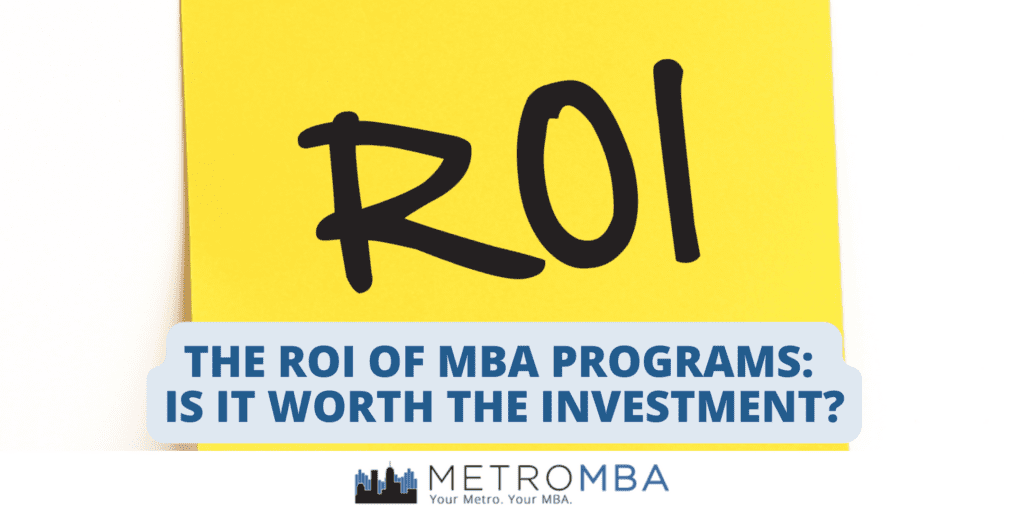The ROI of MBA Programs: Is It Worth the Investment?

Pursuing a Master of Business Administration (MBA) has long been considered a pathway to career advancement, higher earnings, and leadership roles in the corporate world. However, as tuition costs continue to rise and the job market evolves, the return on investment (ROI) of an MBA program has become a critical consideration for prospective students. This article delves into the various factors that influence the ROI of an MBA, exploring both the tangible and intangible benefits, as well as the potential risks involved.
Understanding ROI in the Context of an MBA
ROI is a financial metric used to evaluate the profitability of an investment. In the context of an MBA, ROI is typically calculated by comparing the costs of the program (tuition, fees, and lost income) with the financial gains (increased salary, bonuses, and career advancement) that accrue after graduation. However, a comprehensive assessment of ROI should also account for intangible benefits, such as enhanced skills, networking opportunities, and personal development.
The Tangible Benefits of an MBA
- Increased Earning Potential: One of the most cited reasons for pursuing an MBA is the potential for a significant salary increase. According to the Graduate Management Admission Council (GMAC), MBA graduates often see a substantial salary bump compared to their pre-MBA earnings. For example, graduates from top-tier programs can expect starting salaries in the range of $120,000 to $150,000 or more, which is a considerable increase over the median salary of bachelor’s degree holders.
- Career Advancement: An MBA can open doors to higher-level positions that may have been inaccessible otherwise. Many MBA programs offer specialized tracks (e.g., finance, marketing, entrepreneurship) that equip students with the expertise needed for specific roles. Additionally, the degree often serves as a credential that signals to employers that the candidate possesses a strong foundation in business principles, strategic thinking, and leadership.
- Networking Opportunities: MBA programs are known for their extensive alumni networks, which can be invaluable for career advancement. These networks provide access to industry professionals, potential employers, and business partners. The relationships forged during an MBA program can lead to job opportunities, mentorship, and even entrepreneurial ventures.
The Costs of an MBA
- Tuition and Fees: The cost of an MBA program can vary widely depending on the institution, with top-tier programs often costing upwards of $100,000. In addition to tuition, students must also consider the costs of books, supplies, and other fees. For many, the financial commitment required to pursue an MBA is significant, and paying for it often involves taking on student loans.
- Opportunity Cost: The opportunity cost of an MBA is another crucial consideration. Full-time MBA students typically forgo one to two years of income while in school, which can add up to a substantial sum, especially for those who were earning a high salary prior to enrollment. Part-time and executive MBA programs mitigate this cost by allowing students to continue working while studying, but these options may extend the time required to complete the degree.
- Post-Graduation Debt: Graduating with student debt can impact the overall ROI of an MBA. While increased earnings can help pay off loans, the burden of debt repayment can linger for years, potentially offsetting some of the financial gains.
Intangible Benefits of an MBA
- Skill Development: An MBA program offers a rigorous curriculum that hones essential business skills, such as strategic thinking, leadership, communication, and analytical abilities. These skills are not only valuable in traditional corporate roles but also in entrepreneurial endeavors and non-profit management.
- Confidence and Credibility: Earning an MBA can boost confidence and credibility, both personally and professionally. The knowledge gained, combined with the prestige of the degree, can enhance one’s self-assurance in making business decisions and taking on leadership roles.
- Personal Growth: The MBA experience often challenges students to step outside their comfort zones, confront new ideas, and develop a global perspective on business. This personal growth can lead to a more fulfilling career and life overall.
Calculating and Maximizing Your MBA ROI
To calculate the ROI of an MBA, individuals should estimate the total costs of the program (including tuition, fees, and lost income) and compare this to the projected increase in earnings over time. Online ROI calculators specifically designed for MBA programs can help with this process.
To maximize ROI, prospective students should consider the following:
- Choosing the Right Program: The reputation and ranking of the MBA program can significantly impact ROI. Graduates from top-tier programs often command higher salaries and enjoy stronger job placement rates. However, regional programs or specialized MBAs may offer better returns depending on the industry and geographic location.
- Leveraging Alumni Networks: Actively engaging with the program’s alumni network can lead to valuable job opportunities and career advancement. Attending networking events, seeking mentorship, and participating in alumni activities can enhance the overall value of the MBA.
- Considering Part-Time or Online Options: For those concerned about the opportunity cost, part-time or online MBA programs allow students to continue working while earning their degree. This approach can reduce the financial strain and maintain career momentum.
Conclusion
The ROI of an MBA program is multifaceted, encompassing both tangible financial gains and intangible personal and professional benefits. While the upfront costs can be substantial, many graduates find that the long-term rewards—higher salaries, career advancement, and enhanced skills—justify the investment. However, achieving a positive ROI requires careful planning, including selecting the right program, managing costs, and leveraging the opportunities an MBA offers. Ultimately, the decision to pursue an MBA should align with one’s career goals, financial situation, and personal aspirations.
